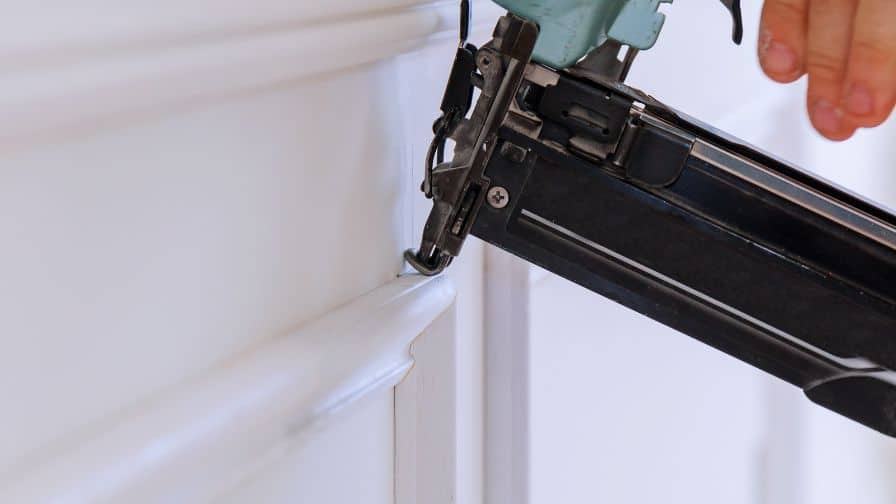
When it comes to choosing the best finish nailer for your needs, there are a lot of factors to consider. Do you need a cordless model or one that plugs into an outlet? What size nails does it use? How powerful is it? And perhaps the most important question of all: which brand should you choose? In this article, we will compare two popular brands of finish nailers – Makita and Paslode – and help you decide which one is right for you.
What Is A Finish Nailer?
A finish nailer is a specialty gun that is used to drive nails into wood and other materials. The finish nails are larger than brad nails, making them ideal for heavy-duty tasks like framing. They give better holding strength than brads because of the extra diameter of the nail. Because these are smooth shank nails with no head, they require less filling and sanding when you’re doing finishing work.
Ultimately, both the Makita and Paslode Finish Nailers have their pros and cons. If you need a finish nailer with excellent battery life and a convenient trigger lock, the Makita will be the better choice for you. Choose whichever one fits your project needs best and you’ll be sure to get the job done right.
Makita Vs Paslode – What’s The Difference
When it comes to finish nailers, you’ve got two great options: The Makita and the Paslode. Both are great tools, but there are some key differences that really set them apart.
For starters, the Makita offers an impressive battery life of up to 1,000 finish nails in a single charge of its 5.0Ah battery. It also features a convenient trigger lock and an anti-dry fire lock, which prevents firing blanks.
Paslode is the clear winner when it comes to the number of nails fired on a single charge – 12,000 from the battery or 1,200 from a full fuel cell. It also reduces jams and misfires when used with genuine Paslode nails.
Ultimately, it comes down to your personal preference, project needs, and budget. Makita’s battery life makes it a great choice for those who need portability, while the variety of nail sizes offered by Paslode may appeal to those who need more precision. Whichever you choose, you’ll have a great finish nailer on your hands!
Can You Use Paslode Nails In Makita?
Subscribe to Paslode USA
The answer is yes! you can use the nails and gas of Paslode with the Makita model to secure your decks, fencing, and other projects around the home.
Using these tools together makes it easier to power through any project you have in mind. The Paslode nailer offers a range of sizes as well as types for different applications. This makes it compatible with Makita tools and allows you to complete your project quickly.
Does Makita Make Good Framing Nailer?
Absolutely! The Makita AN924 framing nailer is an excellent tool with solid value. It provides a reliable and powerful punch, making it the ideal choice for your next project. Plus, it’s lightweight With its simple, easy-to-use design and also its durable construction, this framing nailer can absolutely handle even the toughest jobs.
So, when you need an effective and efficient way to finish your project quickly and easily, Makita nailer is definitely worth considering. Thanks to its high-quality materials and construction, it’s sure to last you a long time—and it won’t let you down!
Factors To Consider When Choosing A Finish Nailer
When selecting a finish nailer, it’s important to consider the size or gauge of the nails that can be fired. For example, carpenters who specialize in trim work may want to have access to a 15-, 16-, 18- and 23-gauge finish nailer. This way they can find the right tool for any trim application. Additionally, some nailers offer the ability to drive a wide variety of nails for applications like crown molding or paneling trim. Be sure to look for these features when looking for the right finish nailer for you.
Pros And Cons Of Makita Finish Nailers
Subscribe to Mr FIXIT
If you need a powerful, reliable finish nailer, the Makita Finish Nailer is an excellent choice. Here’s a look at some of its pros and cons.
Pros:
- The Makita Finish Nailer has tremendous battery life – up to 1,000 finish nails with a single charge of a 5.0AH battery! And, there’s a convenient trigger lock and anti-dry fire lock to prevent firing blanks.
Cons:
- Unfortunately, the Makita Finish Nailer isn’t cheap. It’s also on the heavy side compared to other nailers in its class. Finally, it suffers from the typical firing delay in cordless nailers.
Overall, the Makita Finish Nailer is a great choice for those who need a powerful and reliable finish nailer. It delivers strong performance in an easy-to-use package – though you will have to pay top dollar for it.
Pros And Cons Of Paslode Finish Nailers
The Paslode finish nailer is one of the top tools out there for tackling those tough jobs. But what are the pros and cons of using a Paslode nailer? Let’s take a look!
Pros:
- The Paslode finish nailer drives 12,000 nails on a fully charged battery and 1,200 nails on a full fuel cell, so you’ll be able to get more done with fewer trips back and forth to the charger.
- Paslode nailers are designed to reduce jams and misfires by using genuine Paslode nails. This means your job will run smoothly and quickly every time.
- The Paslode finish nailer is lightweight and easy to maneuver, so you won’t have to struggle with it during your project.
Cons:
- The Paslode finish nailer can be pricey. It also has some reports that it cannot get shorter nails to be driven – so if you have a job with a lot of small nails, this might not be the best choice for you.
Overall, the Paslode finish nailer is an excellent tool for tackling those tough jobs. It’s lightweight, powerful, and reliable – but it does come with a hefty price tag.
Final Thoughts On Makita Vs Paslode Finish Nailers
When it comes to choosing the right finish nailer for your needs, there are some things to consider. Makita and Paslode both offer powerful, reliable tools that make it easy to get the job done quickly and efficiently. The Makita is a bit more affordable and offers more power than the Paslode, but doesn’t have the convenience of a fully charged battery or the option to use fuel cells. The Paslode, however, is easier to operate and can be used to drive thousands of nails on just one charge. It also has the added advantage of reducing jams and misfires by using genuine Paslode nails. Ultimately, it comes down to personal preference when it comes to choosing the right tool for your project. With either option, you can rest assured that you’ll be able to get the job done effectively and efficiently.



